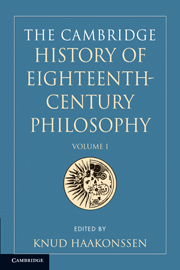Book contents
- Frontmatter
- CONTENTS
- Preface
- Methods of reference and abbreviations
- List of contributors
- I The Concept of Eighteenth-Century Philosophy
- 1 The History of Eighteenth-Century Philosophy: History or Philosophy?
- 2 Concepts of Philosophy
- 3 Schools and Movements
- 4 The Institutionalisation of Philosophy in Continental Europe
- 5 The Curriculum in Britain, Ireland, and the Colonies
- 6 Informal Networks
- II The Science of Human Nature
- Biobibliographical Appendix
- Bibliography
- References
2 - Concepts of Philosophy
from I - The Concept of Eighteenth-Century Philosophy
Published online by Cambridge University Press: 28 March 2008
- Frontmatter
- CONTENTS
- Preface
- Methods of reference and abbreviations
- List of contributors
- I The Concept of Eighteenth-Century Philosophy
- 1 The History of Eighteenth-Century Philosophy: History or Philosophy?
- 2 Concepts of Philosophy
- 3 Schools and Movements
- 4 The Institutionalisation of Philosophy in Continental Europe
- 5 The Curriculum in Britain, Ireland, and the Colonies
- 6 Informal Networks
- II The Science of Human Nature
- Biobibliographical Appendix
- Bibliography
- References
Summary
INTRODUCTION
Modern philosophy began as a protest against the traditional philosophy of the schools. The Italians turned to classical antiquity, whereas the English, the French, and the Germans turned to the emerging natural sciences. Bacon, Descartes, Leibniz, Locke, and many others were, of course, students of philosophy, but they all distanced themselves from scholastic philosophy and its theological dominance. They did not teach ‘school-philosophy’ but remained laymen in both senses of the term, non-theologians and non-professionals. Their interest in natural science was an expression of disgust with traditional textual scholarship; they turned from terminological wrangles to the direct study of the world. Obscure and inaccurate discourse was to be replaced by exact and, where possible, quantifiable knowledge. Modern philosophers no longer searched for truth in the past or in ancient texts but expected to find it in the future, through new research into facts, causes, and principles. In this way, they hoped to establish a new and secure foundation for philosophy, closely associated with science as the model, which even was to be exceeded wherever possible. This concern with certain knowledge was virtually never theoretical; it was generally practical, motivated, for example, by hopes of medical and technological advances. Frequently its aim was a general reform of society, a new politics. At the same time, the awkward problem of religion (the reform of which universally had led to conflict) was set aside by emphasising the distinction between reason and revelation. Subsequently it was gradually reintroduced into the discussion, with the declared intention of reconciling philosophy and religion.
- Type
- Chapter
- Information
- The Cambridge History of Eighteenth-Century Philosophy , pp. 26 - 44Publisher: Cambridge University PressPrint publication year: 2006
References
- 4
- Cited by



